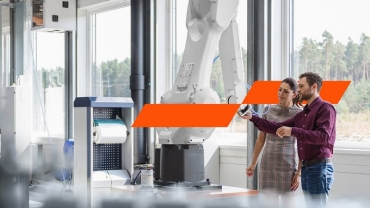
Technology scouting to enable innovations that change the world
FuelUp connects companies to technology that fits their needs
Through their unique machine-learning algorithms FuelUp has built an ever growing global database which now contains more than 1.6 million companies. Their advanced search technology lets corporates connect with emerging technologies worldwide and provides them with an overview of all relevant technologies that can solve their important problems across all industries.
“The technologies that companies need in order to innovate and create new products and services are out there, but just need to be found”, says FuelUp’s CEO, Lucy Howie. “We continuously gather new technologies and ideas from a multitude of external sources, and new technologies are added to our database every week. By adding the unique FuelUp lateral thinking to the search algorithms, technologies and ideas pop up that companies probably never would have found otherwise.”
Corporates and startups/scale ups can complement each other
A lot of bigger companies think startups are waiting to be found by them so that they can work together. Howie: ”Among startups there can be some distrust of big corporates, as they are sometimes afraid a corporate will steal their idea or eat them up to become part of the bigger company.” Looking on the bright side, Howie emphasises that corporates and startups/scale ups can complement each other. “Big corporates have the tools, scale and budget, but are often slow when it comes to change and innovation. Small companies are agile and bring fresh perspective that is all about failing, learning, tweaking and starting again.”
Why companies need to innovate
Lucy Howie discusses the current landscape which is known as the 4th industrial revolution. Fifty-two percent of all FTSE 500 companies have either gone bankrupt or been acquired since the year 2000. And since 2015, fifty-five percent of the Fortune 500 companies haven’t made a profit. “We are in an era where many industries are facing disruption. Big corporates not only need to adopt new digital business models, but they need to adopt innovation in the broadest sense. This requires everyone to adopt a more collaborative and open approach to innovation, which is also an amazing opportunity.”

Innovation needs to be in the heart of the corporate strategy
Howie has observed that in bigger companies innovation is often still seen as a “tick-box exercise” or a “nice-to-have” and not as a core business need. She underlines that in these times of change, innovation including tech scouting needs to be at the heart of the corporate strategy that is driven across the business from the top down. “Having a separate innovation lab or R&D department without strong links to the business or access to a budget doesn’t work. Companies need to have a clear methodology about how to test and implement innovation that’s linked to the overall company strategy. While for small companies failing is a way to learn, there seems to be a real fear of failing in the corporate world. Corporates are typically not set up for failing and moving fast.”
Prerequisites for successful innovation
“For successful innovation these companies need to look beyond their own four walls”, Lucy Howie continues. “FuelUp connects corporates and other companies to technology for the innovation they are looking for. We don’t have the bias that comes with working deep in an industry. We find new technologies across industries and by adding our lateral thinking make sure our customers also get that broader view in their search results. Our customers get the whole technology landscape.” As an example of the application of technology across industries Howie mentions they helped find heat and scratch resistant glass from the medical sector which is now used in phones.


Collaboration with PwC
But before FuelUp starts searching for available technological solutions, PwC first helps the company with its strategy and framework around innovation. Howie: “This also means PwC will help clients define what they need and where they want to go.” Then FuelUp performs an extensive database search, organises the results, selects the relevant technological solutions for the client and compiles an overall market scan. “When presenting the search results to a client, FuelUp’s role is also about inspiring that client with new ideas and acting as a catalyst for change.”
After presenting the search results to the corporate, the next step is for PwC to assist the corporate in implementing the new technology they have chosen. PwC does this by structuring how the technology can be acquired (though a partnership, license deal or even acquisition of a company), further develop business models around these technologies where applicable, and help embed all this into the organisation. Such projects often require elements of change management, but also lead to challenges around, for instance, taxes or supply chain setup.
Business model
FuelUp’s business model has two elements. First, there is the Software-as-a-Service model in which customers pay a monthly subscription fee in order to use the platform to do their own searches. “But we quickly learnt when we built this tool that there is no point in searching if you don’t know what you are looking for”, says Howie. “That is where our tech scouting services come in. Our scouts are experts in finding new and relevant technology to solve business issues. “With a deep-dive search customers get a long list of potential tech partners and a good understanding of the available cross-industry technologies and the impact these can have on their industry.”


Gecko
One of FuelUp’s customers in the fast moving consumer goods industry wanted to know what was available in sustainable packaging. A deep-dive search resulted in technology such as edible plastic. But the search result the company really found interesting was a new super-adhesive that has been developed by MIT spinoff GeckSkin through biomimicry of the gecko. Howie: “This product imitates the gecko sticking to a wall and has a multitude of applications in a variety of industries. If our client would have searched our database themselves they probably only would have looked for cardboard packaging. When defining the problem to be solved we asked: ‘why do you even need packaging?’ Big companies are often so in their zone that they don’t think to look at technologies that have been developed in other industries. A broad vision is added value FuelUp brings. Another example is 3-D body scanning technology from the medical industry. Today, a scan can be made using an iPhone and a clothing retailer now uses it so that customers can try on clothes online using their real body dimensions.”
The Google of technology
“What makes this all so exciting is that we are enabling innovations that will change the world”, Howie says enthusiastically. “All the technology that we see is incredible. We hang out in innovation labs with robots. It is exciting and it gives me hope for the world.” FuelUp has a short-term goal of a million global platform users and they are also working hard to expand and scale their technology scouting services. Howie: “A client recently called us ‘the Google of technology’, which is in fact spot on, although a lot of the technology we find, you would probably not easily find on Google. Our algorithms and constant updating through our own technology means we find things that are very hard to find otherwise.”

About Lucy Howie (CEO of FuelUp)
New Zealander Lucy Howie is a global citizen, having lived all over the world. She has a background in business consulting and did an MBA in Edinburgh. She lived in London for four years where she worked for a venture capitalist as a business consultant and for a private public partnership. Howie then moved to Amsterdam to start working for FuelUp in an innovation consulting role. After a while the founders of FuelUp asked her to run the company as CEO.
Cooperation between FuelUp and PwC
In 2013 FuelUp took part in the startup accelerator programme StartupBootcamp of which PwC has been a partner for years. In 2016 PwC and FuelUp started their partnership. Lucy Howie: “For FuelUp this was a great opportunity to access PwC’s large global network and get a seat at the table with senior business leaders. We are excited about combining our expertise to create value for our customers in delivering new products, services and business models.”
“For PwC the collaboration with FuelUp further strengthens our digital transformation capabilities and addresses an increasing demand of clients for tech scouting services”, says Ilja Linnemeijer, technology expert at PwC. “FuelUp will also be instrumental in PwC’s internal digitisation process. It is great to already see PwC consultants having conversations with their clients about technological innovations that they would perhaps otherwise not have. It opens up conversations about capabilities to help clients become more digital.”
Contact us

















